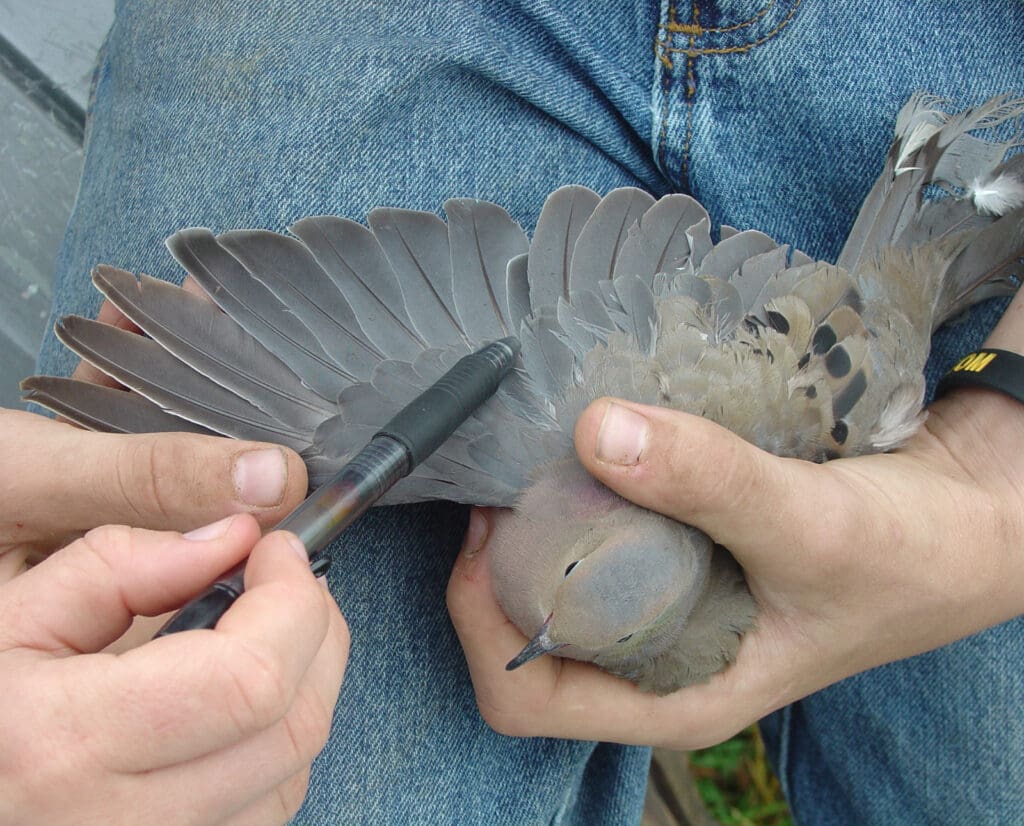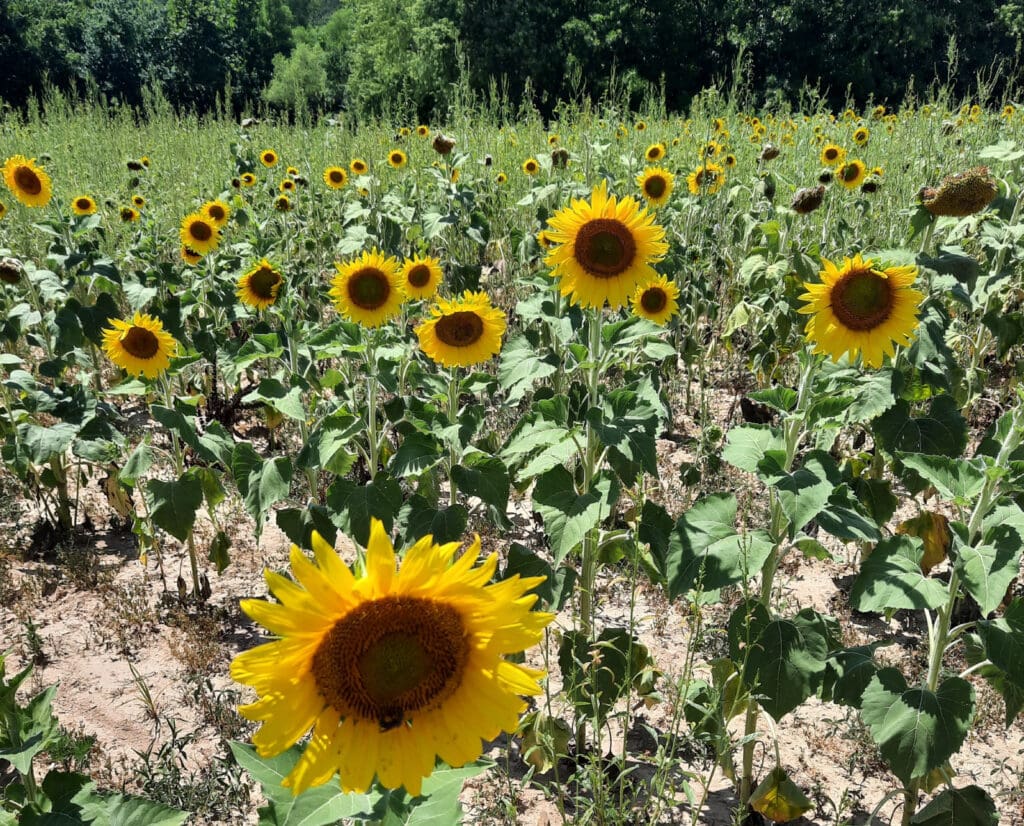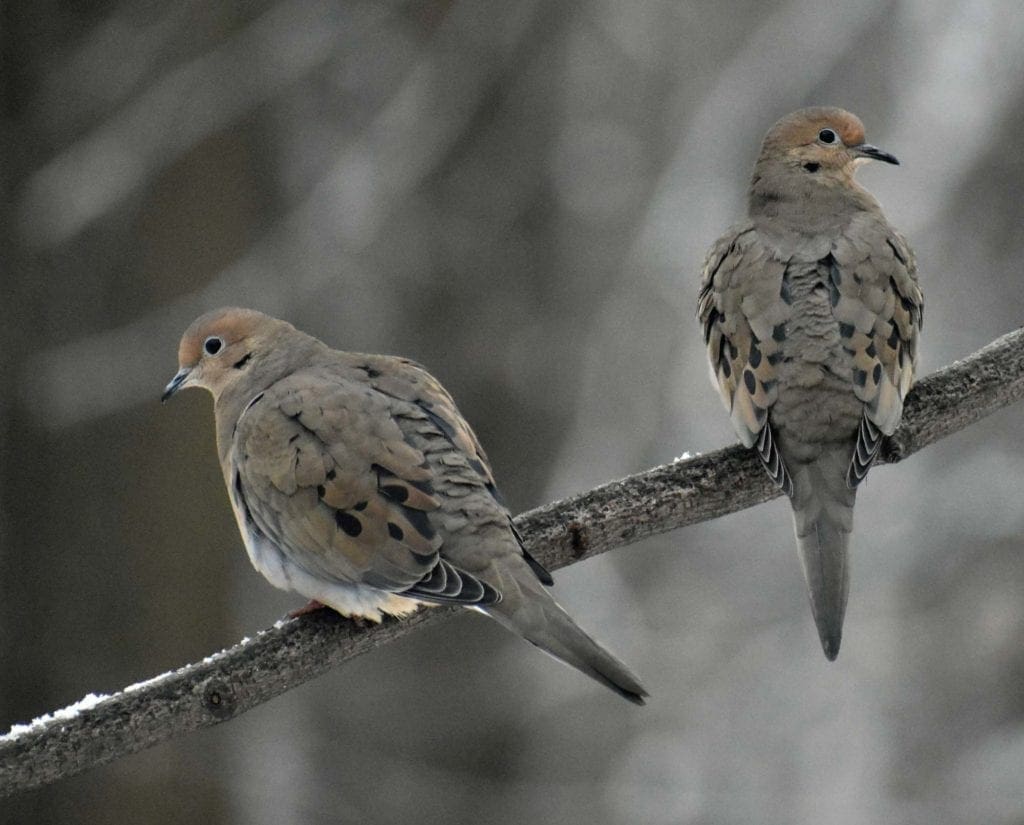Mourning doves are a well-liked, fast-flying sport chook with a haunting name.
On an early afternoon on September 1, three vans pulled into the nook of a wheat stubble subject in central Kansas. The mercury topped out at 93 levels. A father, mom, son, and daughter emerged from one automobile. They approached the opposite two vans and greeted an uncle and a household pal.
Everybody donned camouflage and helped unload their gear. They assembled shotguns, swivel-top buckets, and bins of ammunition on the tailgates. After a brief dialogue of the place every particular person would arrange, the group dispersed and claimed their positions across the subject.
This situation performs out throughout a lot of the USA each September as hunters pursue one of many continent’s most typical birds: the mourning dove. Doves are the highest-harvested sport chook in the USA, with over 10 million bagged yearly.


The excessive harvest price isn’t shocking, contemplating dove searching season is the primary searching season to open for many wing shooters. Nevertheless, the dove’s widespread vary little question contributes to the big harvest. They are often present in practically each state and far of Canada. They breed from the west coast to the east coast, as far north as southeast Alaska and south into Mexico. Such an enormous vary and the flexibility to reside in city and rural landscapes have saved the dove inhabitants strong.
Mourning Dove Details and Identification
| Attribute | Feedback |
| Scientific Title | Zenaida macroura |
| Taxonomic Order and Household | Columbiformes, Columbidae |
| Physique Measurement | 9.1 to 13.4 inches, 3.4 to six ounces, 17.7-inch wingspan |
| Clutch Measurement | 2 eggs |
| Weight loss plan | Seeds |
| Habitat | In all places besides the deep woods |
| Vary | The contiguous United States, southern Canada, Mexico, and Central America |
| International Breeding Inhabitants | 150 million |
| States You Can Hunt Mourning Doves | 41 states |
| Comparable Species | Eurasian Collared Dove, White-winged Dove, Band-tailed Pigeon |
Though doves seem bland in flight, their magnificence can actually be appreciated within the hand. Grownup mourning doves have a brownish-gray colour with an extended, pointed tail and sharply tapered wings. Additionally they have distinct black marks towards the guidelines of their wings.


The true magnificence is clear within the pinkish iridescence round their neck. So, generally males may be discerned from females by a barely blue hue on the highest of their heads. Nevertheless, these blue and pink colours sometimes overlap between sexes, making identification of intercourse lower than 100% correct. Doves have pink toes, which stand out towards their grayish background. Juvenile doves have a extra mottled look, and their feathers present extra brown than grey. Some feathers seem virtually noticed. Even adults are dainty birds, solely weighing 4.5 ounces.
Mourning Dove Breeding
Mourning doves have a barely distinctive breeding habits in comparison with most sport birds. Doves sometimes nest in bushes, preferring evergreens or cottonwoods, however their vary is so massive that their nests are discovered in lots of different tree species. I’ve a pair of doves nest each summer time in an Austrian pine tree in my yard. I can’t attest as to if it’s the identical pair each summer time or completely different birds, however like clockwork, and for properly over a decade, the nest exhibits up each spring.
Female and male mourning doves assemble their nests collectively. The nests are product of twigs, pine needles, or loosely assembled grass stems. These nests are removed from advanced. In truth, most nests appear to be the doves didn’t put a lot effort into the development and stop when the nest was half-built. Floor nests are additionally widespread, notably within the West, the place bushes are extra scarce.
Two plain white eggs are deposited within the nest; incubation takes 14 days. The younger keep within the nest for about two weeks and are fed crop milk, which is sloughed cells from the crop lining of the grownup doves. Few birds make the most of this feeding method. After 14 days, the chicks are thought of fledglings. Right now, the fledglings depart the nest, hop round, and be taught to fly. Additionally they start feeding themselves in the course of the fledgling stage. Younger doves rely totally on seeds however proceed to obtain feedings from their mother and father for one more week or two.
After serving to their chicks navigate the fledgling stage, the feminine mum or dad typically lays one other clutch of two eggs, and all the course of is repeated. Some mated pairs solely hatch one nest, however many will hatch a number of nests all through the summer time. Six nests by one breeding pair aren’t unusual all through all the breeding season, which lasts from late spring by means of August.


Mourning Dove Habitat and Feeding Patterns
Grownup doves and juveniles which have aged past the fledgling stage feed virtually solely on seeds. Agricultural grains, weed seeds, and a few grass seeds dominate their food regimen. Sunflower, wheat, canola, and corn fields are extremely utilized. Ragweed and pigweed seeds, amongst different weedy vegetation, are additionally relished. Seeds from barnyard grass and foxtail are additionally generally consumed. These are only some examples of things present in a mourning dove’s crop, as they’re recognized to eat lots of of species of plant seeds.
Not like quail and pheasants, doves have weak legs and don’t scratch the bottom in quest of meals. Quite, they depend on their eyesight to feed on uncovered seeds mendacity on naked floor. Mourning doves sometimes feed twice a day, as soon as within the morning and once more throughout late afternoon. Like many birds, they fill their crop with seeds after which retreat to a loafing space to spend time digesting their current meal. In keeping with the Cornell Lab of Ornithology’s web site All About Birds, the document variety of bluegrass seeds current in a single dove’s crop is 17,200.
Doves want to loaf on open branches of lifeless bushes or energy strains the place visibility is nice. Throughout excessive temperatures, some could loaf underneath a cover of vegetation which have numerous naked floor beneath. Fields of standing sunflowers or ragweed are generally used to keep away from the warmth whereas digesting their seeds.


In keeping with the Cornell Lab of Ornithology, mourning doves are vulnerable to steer poisoning. “Though Mourning Doves appear to tolerate searching strain, in addition they face the much less seen drawback of lead poisoning,” says the Lab. “Mourning Doves forage on the bottom, and in closely hunted areas they eat fallen lead shot (information present some doves have eaten as much as 43 pellets). Research have discovered this drawback is particularly dangerous round fields planted to draw the doves, the place 1 in 20 doves wind up consuming lead.” Due to this, wildlife managers suggest that hunters chase doves with non-toxic ammunition loaded of their shotguns.
Many doves will cease at a watering gap after a night feeding. They like ponds or lakes with a naked financial institution alongside the water’s edge. Cattle ponds are perfect within the Midwest, as they sometimes have a hoop of naked grime across the pond’s perimeter. A few of these disturbed ponds can even function a meals supply. Extreme cattle use can lead to a flush of ragweed or pigweed simply past the ring of naked grime.


Mourning Dove Migration
As a result of doves have such a big breeding vary, their migration is extremely variable. Some doves start migrating in August as daylight decreases with every passing day. Different doves keep in the identical space year-round. Oftentimes, massive flocks of over 100 birds may be seen in mid-winter, particularly the place satisfactory meals exists. Northern states and territories are a lot much less more likely to harbor overwintering flocks, however the central United States and southern states incessantly maintain doves year-round. Relating to those that migrate, some doves fly 1000’s of miles whereas others solely fly just a few hundred miles or much less.
Banding packages assist researchers perceive how far doves migrate and the way lengthy they reside. When hunters report the band numbers from doves they’ve harvested, this provides wildlife managers two units of knowledge: when and the place the dove was banded, and when and the place the banded dove died. The oldest dove ever recorded was banded in Georgia in 1968; it was shot in 1998 in Florida on the age of 30 years previous.
Whether or not watching the development of a nest in your yard or sitting on a swivel-top bucket in a sunflower subject in September, doves carry enjoyment to hundreds of thousands of individuals. Their vary is spectacular, their breeding habits pretty distinctive, and their migration consistency nothing wanting erratic. Hopefully, gaining a broader understanding helps generate a deeper appreciation of the little chook that brings so many hunters enjoyment each fall.

